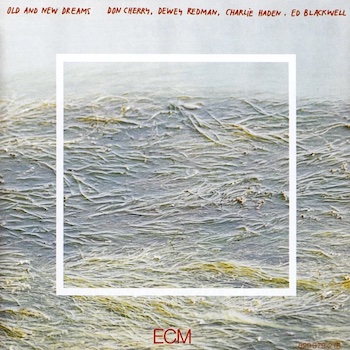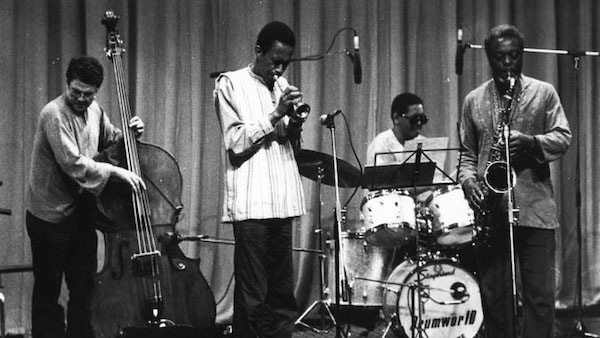Jazz Album Review: “Old and New Dreams” — Reminder of Adventurous Sounds Past
By Michael Ullman
The music this band produced was famously challenging: it was also often surprisingly beautiful.
Old and New Dreams (ECM Luminessence Series, LP, 1979)
 In 1960, Ornette Coleman released his quartet album This is Our Music. A few years later, I remember standing in a record store and staring at the cover, which showed the four musicians staring right back. The band — Ornette Coleman with trumpeter Don Cherry, bassist Charlie Haden, and drummer Ed Blackwell — couldn’t have looked more serious. Haden seems to be glaring at the camera hostilely. Cherry, called “Donald” on the cover, looks as if he might once have smiled, while Blackwell stares downward. Of course, I bought the record, and of course, I was startled by the geniality of the actual music, the bounce provided by Blackwell’s tom-toms and the oddly lyrical playing by the others. I noted then that Coleman’s compositions often seemed to come in two parts: a relatively slow melody followed by a fearsome scramble. The soloist could develop either part. The music they produced was famously challenging; it was also often surprisingly beautiful.
In 1960, Ornette Coleman released his quartet album This is Our Music. A few years later, I remember standing in a record store and staring at the cover, which showed the four musicians staring right back. The band — Ornette Coleman with trumpeter Don Cherry, bassist Charlie Haden, and drummer Ed Blackwell — couldn’t have looked more serious. Haden seems to be glaring at the camera hostilely. Cherry, called “Donald” on the cover, looks as if he might once have smiled, while Blackwell stares downward. Of course, I bought the record, and of course, I was startled by the geniality of the actual music, the bounce provided by Blackwell’s tom-toms and the oddly lyrical playing by the others. I noted then that Coleman’s compositions often seemed to come in two parts: a relatively slow melody followed by a fearsome scramble. The soloist could develop either part. The music they produced was famously challenging; it was also often surprisingly beautiful.
Three quarters of that group, with tenor saxophonist Dewey Redman substituting for Ornette Coleman, formed the group Old and New Dreams in the mid-’70s as a tribute to their one-time leader. (Coleman was himself still playing and wouldn’t pass on until 2015.) In 1975 they made for Black Saint the record Old and New Dreams. What struck me in that release was the sheer beauty of some of the playing, particularly Don Cherry’s lyrical solo on “Chairman Mao.” That piece includes a vibrant bass solo over the singing of a Chinese woman deep in the background. It’s a kind of lament: Coleman’s disciples were adept at doing sorrow songs as well as merry ones. The quartet was valuable in a secondary way: it reintroduced Coleman compositions that we wouldn’t have otherwise heard, including “Handwoven,” which receives its only recording on this Black Saint disc. (It’s been reissued on a box set entitled Charlie Haden.)
Newly reissued by ECM on an audiophile LP, this 1979 recording is the band’s second offering. Confusingly, it is also called Old and New Dreams. It begins ravishingly, with Charlie Haden playing a solo introduction to Coleman’s most famous tune, “Lonely Woman.” Haden had one of the richest bass sounds ever, and it is captured warmly by ECM. All praise is due to the engineers. The recorded sound is excellent throughout, including a sweetly precise mid-range. Blackwell’s drums are spread across the sound stage. Normally I’d disapprove of this, but in several places, including Blackwell’s solo on the oddly titled “Orbit of LA-BA,” the recorded sound helps us hear his performance as what it is — a conversation with himself, the bass drum in the left channel answering the pattern on tom-toms in the right.
Everyone gets to solo on the 12-minute “Lonely Woman.” The quartet takes the melody at about half the tempo of the 1960 recording — the melody as stated by Cherry seems suspended in air, while Blackwell plays at his own brisk pace. Haden goes intently up and down a scale before he reaches the second part of the composition, when he suddenly strums fiercely as Cherry squeals. The first solo is Redman’s. Later, Cherry enters with his own version of the deeply compelling melody.

Old and New Dreams in action. (L-R): Charlie Haden, Don Cherry, Ed Blackwell, Dewey Redman. Photo: On the Corner
Each musician has a feature on this ECM record. Ed Blackwell’s “Togo” begins with Cherry stating the folksy melody via a resonant solo. Then Blackwell sings what sounds like a vocal version of a drum solo before he enters on percussion. His solo is, as usual, melodically rich. The New Orleans-born drummer plays on tom-toms in a dancing style, here under the persistent ring of his cowbell. The quartet takes up Cherry’s “Guinea,” which again begins with an atmospheric solo trumpet. The band enters. Haden and Redman initially play the the core of the theme in unison, then Cherry solos with his unique combination of anxious squeals and naïve-sounding folk sounds. The shock here is that Cherry plays piano behind Redman’s solo.
There’s more doubling on Redman’s “Orbit of LA-BA.” Redman plays the musette, a double-reed instrument that looks and sounds like a small oboe. This piece includes some overdubbing so at some points we hear two musettes. The sound, with Redman high in the treble, seems to isolate him even when he is backed by the others: Haden’s feature is a number he recorded four times, his “Song for the Whales.” He not only dedicates the piece to these creatures: he imitates their cries on his bowed bass. Haden makes hollow cries as well as eerie groans and creaks. “Song for the Whales” shows us how Cherry would sound if called in to play duets with leviathans. The Coleman composition on the album is his “Open or Close.” It’s typical of this composer to invite the musicians to make a choice, though I am not sure what open or close means musically. Coleman himself never recorded this piece.
Live, Old and New Dreams was one of the delights of the late ’70s and 80s. This LP is a fine representation of that band’s adventurous sound.
Michael Ullman studied classical clarinet and was educated at Harvard, from which he received a PhD in English. The author or co-author of two books on jazz, he has written on jazz and classical music for the Atlantic Monthly, New Republic, High Fidelity, Stereophile, Boston Phoenix, Boston Globe, and other venues. His articles on Dickens, Joyce, Kipling, and others have appeared in academic journals. For over 20 years, he has written a bi-monthly jazz column for Fanfare Magazine, for which he also reviews classical music. At Tufts University, he teaches mostly modernist writers in the English Department and jazz and blues history in the Music Department. He plays piano badly.
Tagged: Charlie Haden, Dewey Redman, Don Cherry, ECM Ornette Coleman, Ed Blackwell, Old and New Dreams

I always liked this record, and now I’m curious to hear it on the remastered LP. My original LP is about worn out after all these years.
I often wondered how Ornette escaped making a record for ECM. Surely has old bandmates tried to persuade him. It must have been tempting seeing them get together and make music of this quality without him.